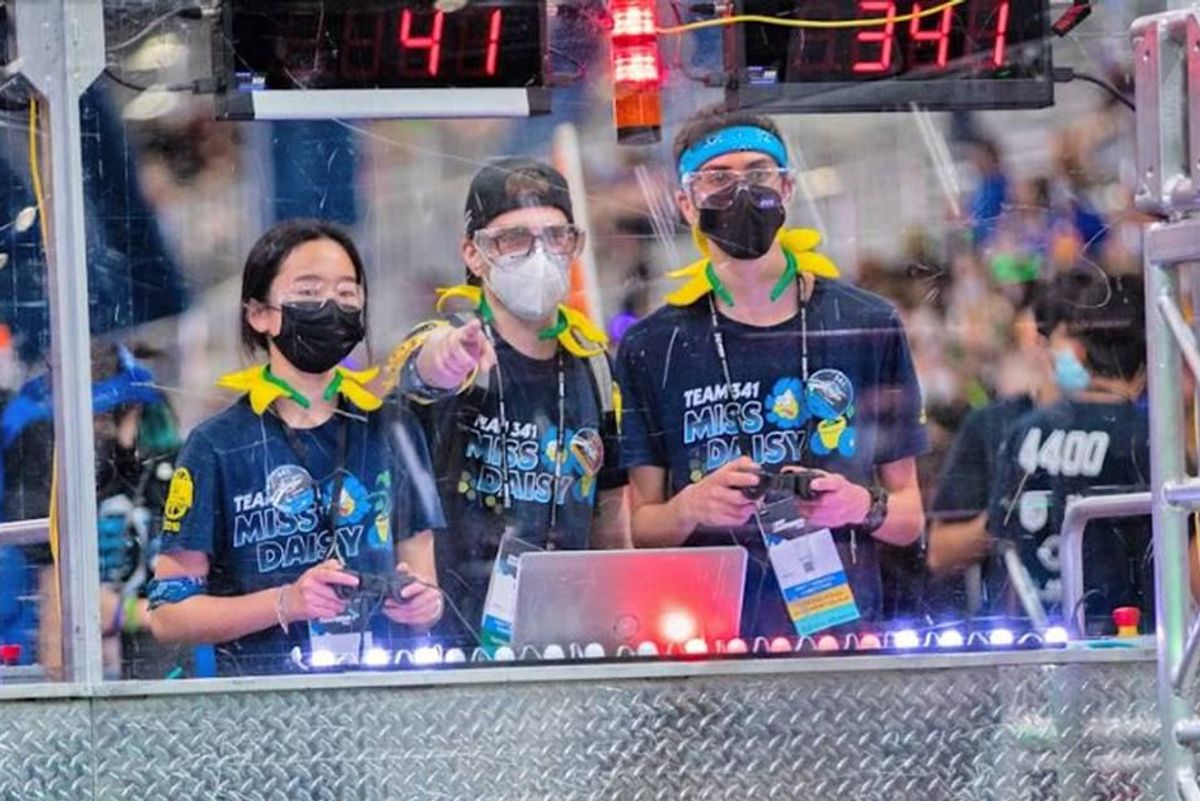
FIRST students compete in a robotics challenge.
Societies all over the world face an ever-growing list of complex issues that require informed solutions. Whether it’s addressing infectious diseases, the effects of climate change, supply chain issues or resource scarcity, the world has an immediate need for problem-solvers with science, technology, engineering and mathematics (STEM) skills.
Here in the United States, we’re experiencing a shortage of much-needed STEM workers, and forward-thinking organizations are stepping up to tap into America’s youth to fill the void. As the leading youth-serving nonprofit advancing STEM education, FIRST is an important player in this arena, and its mission is to inspire young people aged 4 to 18 to become technology leaders and innovators capable of addressing the world’s pressing needs.
Founded by inventor Dean Kamen in 1989, FIRST is a global community that helps young people discover their passions for STEM through exciting robotics-based challenges. It develops team-based competitions and other innovation-driven programs that engender resilience, cooperation, empathy and problem-solving. The 2022 FIRST season included more than 679,000 students from 110 countries, who were supported by over 320,000 adult mentors, coaches and volunteers. The season recently concluded with the global FIRST Championship, where thousands of teams from around the world came together to celebrate what they had learned.

“We just have so many problems that we need to solve, and I truly believe that a lot of them need technological solutions,” Fazlul “Fuzz” Zubair told Upworthy. Zubair is the systems engineering department manager at Raytheon Technologies, an American multinational aerospace and defense conglomerate. He mentors FIRST Team 4201: The Vitruvian Bots in Los Angeles.
“Even the problems that don’t appear to be technological in nature will require big data or to make the next big breakthrough in energy, transportation, or our ability to observe our known universe,” said Zubair.
The robotics-based programs that FIRST provides expose students to global challenges and encourages them to do their part to be problem solvers. Annual FIRST seasons are themed around the United Nations’ Sustainable Development Goals and are meant to encourage participants’ critical thinking and innovation across a breadth of worldwide issues, including poverty, inequality, climate change, environmental degradation, peace, and justice. The Goals, much like the mission of FIRST, are an attempt to achieve a better and more sustainable future for all.
“These challenges not only help students put their STEM and life skills to the test but get them thinking about how technology can address critical community, national and global problems,” FIRST CEO Chris Moore told Upworthy. “Mentorship is the critical piece that helps students up-level their learning.”
FIRST students develop strategies for addressing complex challenges by working with enthusiastic, experienced mentors who are professionals in STEM fields.
“When STEM gets challenging, mentors are there to collaboratively help students navigate the problem, find solutions, and discover their own resiliency,” said Moore. “Many young people—especially those from underrepresented, underserved, and vulnerable populations—struggle to envision themselves in STEM fields. Mentorship can combat this self-doubt and help more students discover their path and sense of belonging in these careers."
FIRST students develop a solution-based mentality and are armed with problem-solving skills, empowering them to make a direct impact on their communities and the world around them.
FIRST Team 316, the Lunatecs, formed in Carney’s Point, New Jersey, in 1999 as a FIRST Robotics Competition team and later established a nonprofit, the South Jersey Robotics. The SJR team designs, fabricates and donates adaptive devices to improve the lives of physically challenged individuals and the organizations that serve them.

“We wanted to apply the skills we’ve learned in real-life situations and creating an adaptive device program allowed us to do that,” student Seth Simpkins told Upworthy. Recently, the FIRST team created Jump Assist, an adaptive jump rope that allowed a young boy with congenital amputation to play like the rest of the kids at his school.
FIRST Team Buckets of Ravena, New York, founded the nonprofit We Give Water in partnership with U.K.-based eWaterPay to help address the global problem of clean water accessibility. The nonprofit has raised $55,000 to fund 40 sustainable systems in Gambia, West Africa, that provide clean water access to more than 20,000 people.
“While we might take accessible water for granted here, in other countries water means life. We wanted to help bring life to those in need so they could be able to worry less about where their water was coming from and more on important things, such as school and health,” FIRST Team Buckets member Elizabeth Robertson told Upworthy.

Raytheon Technologies’ Zubair is confident that the opportunities provided through FIRST are contributing to a new generation of much-needed problem-solvers.
“By creating more people that get excited, that say, ‘This is what I want to do, I want to develop technology,’ we are creating a group of people who are primed to solve our tough problems,” he told Upworthy. Zubair even used his participation in FIRST to create a pipeline of qualified STEM talent for his team: he has hired 15 FIRST alumni to work with him at Raytheon Intelligence & Space, and many of these hires give back in their free time to mentor local teams.
FIRST students supply ample proof that young people don’t have to wait until they graduate high school or get a job in a STEM industry to make a difference. They can start now by picking up the skills they need for success in STEM and life through FIRST.
“Don’t wait for anything,” Robertson said. “If you are given the opportunity to do something amazing, do it. The one thing our team said every time someone asked this question was, you are never too young to change the world. STEM skills are meant to do good.”
Simpkins agrees: “I say you don’t have to wait. In fact, waiting is the worst thing you can do. Be open to new experiences and believe in yourself.”
To learn more about FIRST and to get involved, go to firstinspires.org.






